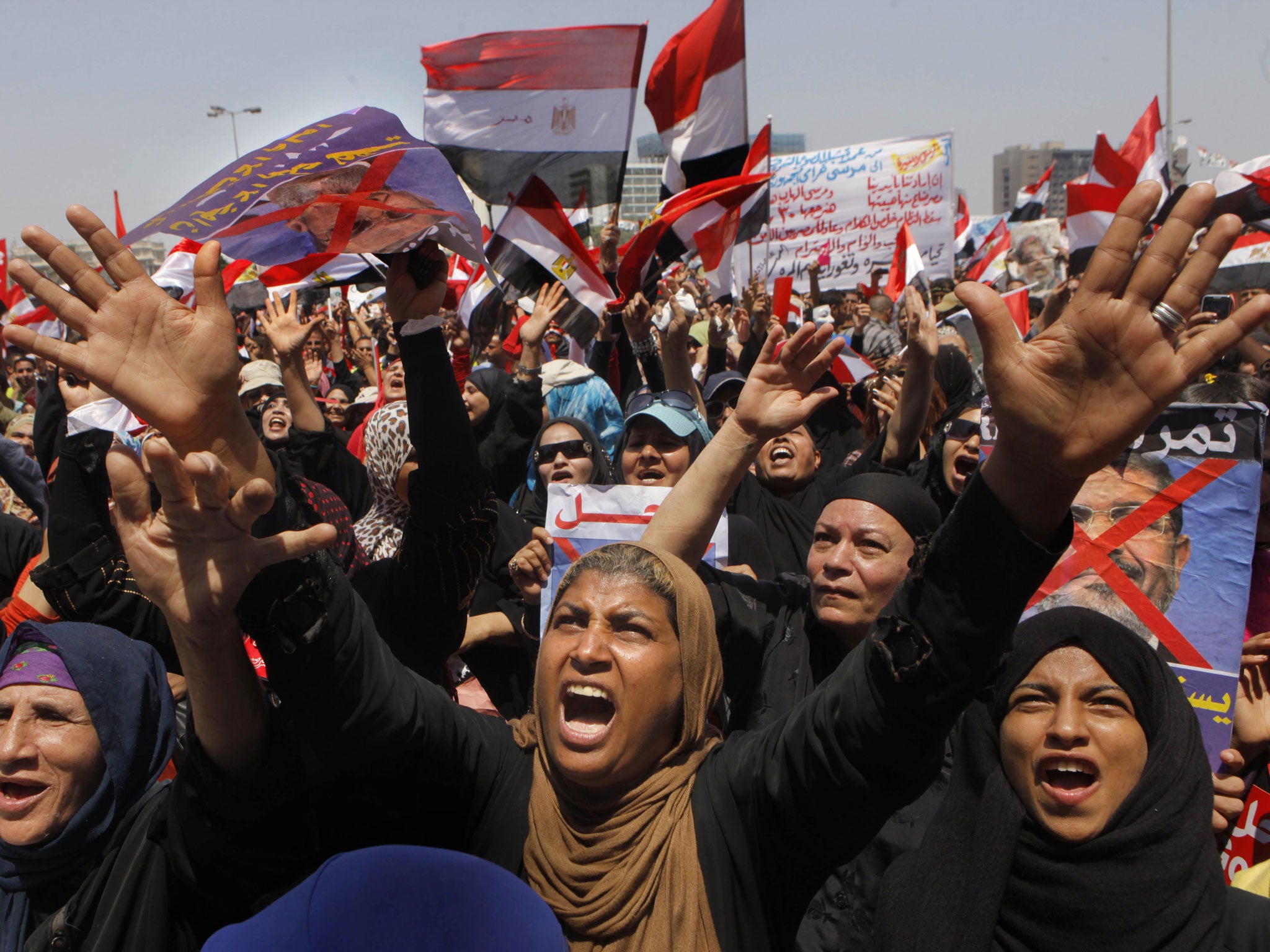Egypt: Vast crowds of protesters call for President Morsi to quit
The demonstrations come of the first anniversary of Morsi's election

Your support helps us to tell the story
From reproductive rights to climate change to Big Tech, The Independent is on the ground when the story is developing. Whether it's investigating the financials of Elon Musk's pro-Trump PAC or producing our latest documentary, 'The A Word', which shines a light on the American women fighting for reproductive rights, we know how important it is to parse out the facts from the messaging.
At such a critical moment in US history, we need reporters on the ground. Your donation allows us to keep sending journalists to speak to both sides of the story.
The Independent is trusted by Americans across the entire political spectrum. And unlike many other quality news outlets, we choose not to lock Americans out of our reporting and analysis with paywalls. We believe quality journalism should be available to everyone, paid for by those who can afford it.
Your support makes all the difference.Tens of thousands of protesters surrounded the palace of President Mohamed Morsi last night as the nation’s mutually hostile political factions took to the streets for a long-anticipated day of protest.
While the main demonstrations were peaceful and festive in atmosphere, seven people were shot dead in clashes in the central cities of Assiut, Beni Suef and Fayoum and outside the Brotherhood's Cairo headquarters. The Health Ministry said 613 people were wounded in street fighting around the country.
Clerics have warned of civil war and activists were steeling themselves for violence – yet nobody in Egypt appears to know quite what forces have now been unleashed.
Many of the city’s streets were eerily calm as families stayed at home in anticipation of widespread chaos. Metalworkers, meanwhile, have seen a sharp increase in demand for homemade handguns. In Tahrir Square, the crucible of the 2011 insurrection, an estimated 200,000 protesters gathered to chant for an end to Mr Morsi’s rule. Later, a sea of demonstrators – many carrying banners featuring the faces of protesters killed during the past two years of unrest – congregated outside Heliopolis Palace, Mr Morsi’s presidential seat.
“I don’t want Egypt to be the next Iran,” said 21-year-old Hussein Ahmad. “That is what the Muslim Brotherhood wants.”
Nearby in Nasr City, a suburb in eastern Cairo not far from the palace, Mr Morsi’s own supporters had massed. The Muslim Brotherhood’s Islamist allies are angry at what they see as an illegitimate attempt to subvert the democratic will.
For Mr Morsi and his supporters, the stakes over the next few days could not be higher. A recent article in a liberal newspaper provided an overview of George Orwell’s anti-totalitarian satire Animal Farm. A tongue-in-cheek disclaimer told readers that any similarities with the current political situation were purely co-incidental.
In the minds of many of his opponents, Morsi the would-be revolutionary has become Morsi the despot. The President, who famously stood in Tahrir Square following last year’s election and bore his chest to prove he was not wearing a bulletproof vest, has become the unbearable bête noire of many Egyptians, who see him as the embodiment of a country gone to seed, who is representing only the Brotherhood’s interests, not theirs.
After coming to power on the back of a broken Brotherhood promise not to field any presidential candidates, he initially won plaudits for his diplomatic interventions between Israel and the Palestinians.
Yet shortly afterwards he proceeded to alienate the nation’s secular political factions. In November he issued a bitterly disputed decree shielding his decisions from the judicial oversight. The decree was later rescinded, but soon afterwards Mr Morsi approved a referendum on a highly divisive constitution which had been haphazardly forced through an Islamist-dominated assembly. It was this move that convinced many of the President’s critics that the Muslim Brotherhood was not interested in compromise. On the back of a sliding economy, the constitutional concerns of a liberal and secular elite have been bolstered by the growing anger of Egyptians who can barely put food on the table.
The Brotherhood argues, with some justification, that many of its actions have been a result of having to contend with a hostile judiciary and unhelpful elements from the previous regime.
But now, as Mr Morsi finds himself faced with a popular insurrection reminiscent of that which toppled his predecessor, Hosni Mubarak, it appears that no outcome will fully satisfy the demands of Egypt’s main political players.
Many analysts and opposition politicians believe that the only way the President will step down is if he is forced to by the military – a re-run of February 2011, when Mr Mubarak was left hanging by his generals.
Yet Egypt’s commanders, stung by their experience of running the country after Mubarak was ousted, may only intervene only if serious unrest develops. “The army doesn’t want to rule directly,” said Cairo-based political expert Dr Ashraf el-Sherif. “The only way they will intervene is if the country is out of control.”
It leaves the opposition in a political bind. Officially their leading lights renounce violent protest and the prospect of a ‘soft coup’. Yet privately many accept that it is a military intervention which will defeat Morsi – and such an outcome will only be secured by the violent deaths of protesters.
Join our commenting forum
Join thought-provoking conversations, follow other Independent readers and see their replies
Comments